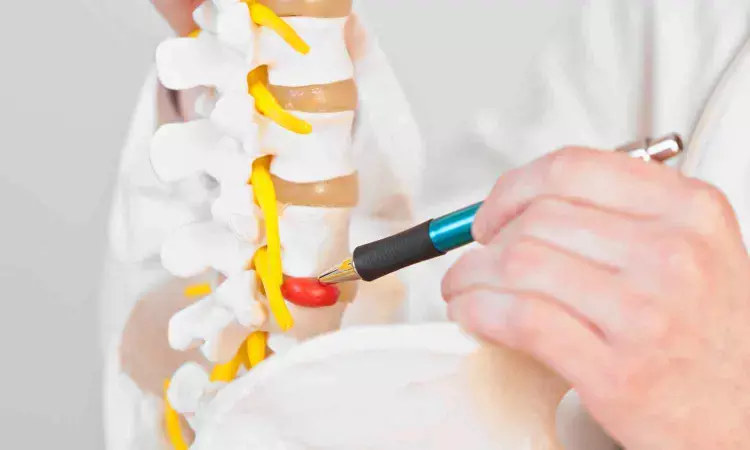- Home
- Medical news & Guidelines
- Anesthesiology
- Cardiology and CTVS
- Critical Care
- Dentistry
- Dermatology
- Diabetes and Endocrinology
- ENT
- Gastroenterology
- Medicine
- Nephrology
- Neurology
- Obstretics-Gynaecology
- Oncology
- Ophthalmology
- Orthopaedics
- Pediatrics-Neonatology
- Psychiatry
- Pulmonology
- Radiology
- Surgery
- Urology
- Laboratory Medicine
- Diet
- Nursing
- Paramedical
- Physiotherapy
- Health news
- Fact Check
- Bone Health Fact Check
- Brain Health Fact Check
- Cancer Related Fact Check
- Child Care Fact Check
- Dental and oral health fact check
- Diabetes and metabolic health fact check
- Diet and Nutrition Fact Check
- Eye and ENT Care Fact Check
- Fitness fact check
- Gut health fact check
- Heart health fact check
- Kidney health fact check
- Medical education fact check
- Men's health fact check
- Respiratory fact check
- Skin and hair care fact check
- Vaccine and Immunization fact check
- Women's health fact check
- AYUSH
- State News
- Andaman and Nicobar Islands
- Andhra Pradesh
- Arunachal Pradesh
- Assam
- Bihar
- Chandigarh
- Chattisgarh
- Dadra and Nagar Haveli
- Daman and Diu
- Delhi
- Goa
- Gujarat
- Haryana
- Himachal Pradesh
- Jammu & Kashmir
- Jharkhand
- Karnataka
- Kerala
- Ladakh
- Lakshadweep
- Madhya Pradesh
- Maharashtra
- Manipur
- Meghalaya
- Mizoram
- Nagaland
- Odisha
- Puducherry
- Punjab
- Rajasthan
- Sikkim
- Tamil Nadu
- Telangana
- Tripura
- Uttar Pradesh
- Uttrakhand
- West Bengal
- Medical Education
- Industry
Cow slime may help disc herniation patients after surgery, suggests study

Researchers at Uppsala University have developed a gel inspired by cow slime for patients suffering from disc herniation. By adding the mucin gel immediately after surgery, it is possible to create a protective barrier around the discs to prevent the immune system from attacking their nucleus pulposus. This keeps the discs intact and reduces the risk of further damage.
“This new approach offers hope for those suffering from back pain caused by disc herniation and may prevent further damage after removing herniated discs, potentially improving the quality of life for the patients,” says Hongji Yan, researcher at the Department of Medical Cell Biology at Uppsala University and AIMES (Center for the Advancement of Integrated Medical and Engineering Sciences) at Karolinska Institutet, whose study was recently published in Advanced Science.
Herniated discs are a common problem that can cause severe pain and impaired function of the spine. Many people need surgical removal of herniated discs to relieve the pressure on the nerves in the spine. After surgery, most patients are treated with anti-inflammatory drugs or steroid injections to manage pain and swelling. However, as yet there is no treatment that stops the immune system from attacking the leftover disc tissue, which can make the injury worse and cause more pain. This shows a gap in post-surgery care for herniated discs, where new treatments that focus on controlling the immune response could help improve recovery and reduce long-term pain.
Currently, most research focuses on trying to regenerate damaged discs rather than preventing further damage. However, because discs lack blood vessels, have few cells and are subject to constant physical stress, it is very difficult to make these solutions work.
In a new study, researchers explored an innovative solution for post-surgery care aimed at preventing further damage after the surgical removal of herniated discs. They developed a synthetic mucin gel, inspired by the mucus coating of certain parasites, which suppresses immune cell activation at infection sites to prevent immune cell recognition. When applied to the surgical site, this gel prevents further disc damage by stopping immune cells from attacking the nucleus pulposus of intervertebral discs, thanks to its immune-suppressive properties. In contrast, traditional physical barriers like alginate gels failed to provide this level of protection, as demonstrated in the study.
“This approach could have a major impact on surgical procedures, as a simple injection of mucin gels at the surgical site could improve patient outcomes, reduce the risk of long-term complications, and increase the overall success rate of disc surgery,” Hongji Yan concludes.
Reference:
Huan Wang, Song Chen, Zhao Liu, Qingchen Meng, Rita Sobreiro-Almeida, Ling Liu, Håvard Jostein Haugen, Jiaying Li, João F. Mano, Youzhi Hong, Thomas Crouzier, Hongji Yan, Bin Li, Preserving the Immune-Privileged Niche of the Nucleus Pulposus: Safeguarding Intervertebral Discs from Degeneration after Discectomy with Synthetic Mucin Hydrogel Injection, Advanced Science, https://doi.org/10.1002/advs.202404496.
Dr Kamal Kant Kohli-MBBS, DTCD- a chest specialist with more than 30 years of practice and a flair for writing clinical articles, Dr Kamal Kant Kohli joined Medical Dialogues as a Chief Editor of Medical News. Besides writing articles, as an editor, he proofreads and verifies all the medical content published on Medical Dialogues including those coming from journals, studies,medical conferences,guidelines etc. Email: drkohli@medicaldialogues.in. Contact no. 011-43720751


